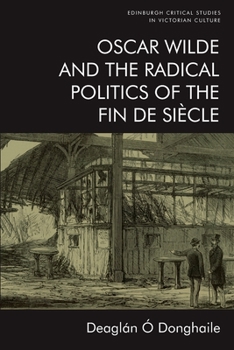Oscar Wilde and the Radical Politics of the Fin de Siècle
Explores the influence of contemporary radicalism over Oscar Wilde
Offers a new, politicised interpretation of Wilde's most famous literary worksContextualises Wilde's writing by reading it against the contemporary political crises that it addressed Focuses on archival research, drawing on Wilde's correspondence, reviews, interviews, unpublished lectures and speechesProvides a theoretical approach to Wilde's subversive opinions on the problems posed by capitalism, property and empire, and how he consistently opposed the authority of the state in bourgeois-imperial BritainClarifies the relationship between Wilde's aestheticism, his anticolonial beliefs and his support for anarchism
This book reads Oscar Wilde's literary texts in relation to his open support for revolutionaries, along with his expressions of solidarity with Irish republicans, anarchists, workers and migrants. Framing Wilde's literary writing in relation to his very active participation in the radical political culture of the fin de si cle, Donghaile argues that, contrary to contemporary representations of Wilde as an effete and socially disengaged figure, his aesthetical radicalism was informed by and contributed to a broader set of progressive political initiatives being pursued at the end of the nineteenth century.
Consisting of previously unpublished material, the book provides a politicised and historicised account of Wilde's key works by situating them within the framework of his very pronounced ideological commitment to these radical political causes.





